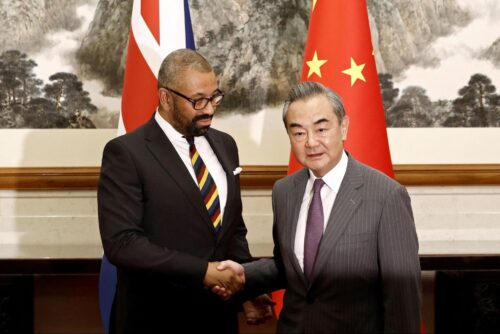U.K.’s Sunak faces tricky balancing act on China
U.K. Prime Minister Rishi Sunak is making an effort before next year’s parliamentary dissolution to get Sino-British relations on a more even keel. The country's bicameral legislature has been scathing toward the government’s approach.

The United Kingdom is planning to send its top diplomat to China for a visit, possibly signaling a recalibration of its China policy.
British Foreign Secretary James Cleverly is due in China at the end of this month, Reuters reported. The trip was originally scheduled in July but was postponed because of his Chinese counterpart Qín Gāng’s 秦刚 disappearance. The last visit by a British minister was in 2021, when then climate change tsar Alok Sharma went to Tianjin for climate talks.
Last December, Cleverly called China “potentially an important partner for good” on climate change, a view that was blasted by his party’s former leader and China hawk, Sir Iain Duncan Smith.
The U.K.’s policies toward China and Chinese military threats against Taiwan have massive implications in the Indo-Pacific, where big powers are jostling for influence. Britain has global clout as a member of G7, the UN Security Council, the Five Eyes intelligence alliance, and the Comprehensive and Progressive Agreement for Trans-Pacific Partnership (CPTPP). It is the largest contributor in military aid to Ukraine after the U.S.
Prime Minister Rishi Sunak is making a last-ditch effort before next year’s parliamentary dissolution — followed by an election — to get Sino-British relations on a more even keel, even as debates over Xí Jìnpíng’s 习近平 China have torn his Conservative Party apart. President Emmanuel Macron of neighboring France sparked a furor at home and abroad over his comments on China-U.S. relations, when he said in April that Europe should not be “America’s followers.” Germany is also in a quandary over China.
Sunak in recent months resumed ministerial visits to and from Hong Kong, the first since the city’s China-backed government in 2019 triggered massive backlash over its extradition bill. The protests were followed by a severe National Security Law crackdown that ended many of the city’s decades-long freedoms.
U.K.-China relations have undergone huge changes under five recent prime ministers, all from the Conservative Party. David Cameron created the “Golden Era” with Xi to attract Chinese investment. Theresa May paused the Chinese-backed Hinkley Point C nuclear power station in southwestern England, but was torn by the desire to expand the U.K.’s global trade post-Brexit. Boris Johnson moved to ban Chinese telecom giant Huawei under pressure from U.S. President Donald Trump.
The future of Britain and China?
Sunak, who took over as prime minister in 2022, is bound by law to dissolve parliament by the end of next year, and has prioritized economic growth after his predecessor plunged the country into the brink of recession.
But the government’s cautious resumption of economic engagement with China has led to a backlash from lawmakers who are active in the Inter-Parliamentary Alliance on China and China Research Group.
“Sunak and Cleverly yearn for a return to ‘the golden era’ of Cameron and [George] Osborne and seem indifferent to the current £40 billion trade deficit with China,” said David Alton, a cross-bench peer who has been in the national legislature since 1979. “To understand the divergence from the security-led approach of Truss you simply have to follow the money. Sir Iain Duncan Smith is right to warn that this is 1930s-style appeasement.”
In a sign of a split in the ruling party, Sunak’s immediate predecessor, Truss, visited Taiwan in May, becoming the first former British leader to set foot on the island in 27 years.
There is a diversity of voices in the British establishment, including those who see the need to engage with China. “For the current administration’s China policy, as with other aspects of governance, it’s best to use Michael Heseltine’s observation: ‘The adults are back in charge,’” said Michael Reilly, formerly Britain’s de facto ambassador to Taiwan and chief representative in China for defense giant BAE Systems.
“China flipped when the U.K. gave many Hongkongers, at least British National Overseas passport holders, a scheme to move to Britain. The relationship plunged to a new low in recent decades,” the retired diplomat said. However, despite frosty ties, China didn’t lash out punitive measures against Britain in a way it did to Canada and Australia.
“The crackdown on Hong Kongers and the Uyghers are no longer ‘live’ as they were a few years ago. But Taiwan is now a much bigger issue for the British government — that was unthinkable until recently,” Reilly told The China Project.
Communist Party mouthpiece Global Times recently praised Sunak’s decision to send investment minister Lord Dominic Johnson and former business tsar Lord Peter Mandelson to China in May and June, respectively. “This reflects Sunak’s relatively pragmatic attitude in addressing China-U.K. relations,” it wrote.
“There is no question that the U.K. has been trying to forge a China policy that threads the needle between values and economic opportunity,” said Luke de Pulford of The Inter-Parliamentary Alliance on China, a global parliamentary grouping. “The U.K. lacks sufficient economic leverage to make values-based demands of Beijing, and for that reason is unlikely to secure meaningful movement.”
It’s hard to envisage much coming out of Cleverly’s China trip from a human rights perspective, de Pulford noted. “Rather, it looks a bit like Britain turning up with a begging bowl, knowing that concerns will be raised in a perfunctory way, and almost certainly swatted away by Beijing.”
A split between parliament and government
Britain’s bicameral legislature has been scathing toward the government’s approach. In a report published last month, the parliament’s Intelligence and Security Committee (ISC) concluded that the British government has “no strategy on China, let alone an effective one.”
China has managed to “successfully penetrate every sector of the UK’s economy,” the report said, warning that Britain is “severely handicapped by the short-termist approach currently being taken.”
Such an assessment is not new. Two years ago, the House of Lords International Relations and Defence Committee called for the government to produce a “single, coherent China strategy” in a report.
“The U.K. Parliament — across both Houses and across the aisle — has been resolute in challenging dependency on China, insisting on resilience, highlighting the security risks from the Chinese Communist Party, and defending democracy in Hong Kong, the freedom of Taiwan, and the Uyghur victims of Genocide,” Alton said. In contrast, the government recently appears “incapable of deciding whether the CCP is a threat,” the veteran lawmaker told The China Project.
There are influential establishment figures who disagree. Former Foreign Office chief Lord Simon McDonald told the New Statesman in May that Britain should not “make an enemy of China.”
“This, for me, would be a break point between London and Washington,” the former bureaucrat argued, adding that ex-prime minister Harold Wilson didn’t send troops to join the U.S. in the Vietnam War.
But he is in the minority among Britain’s policymakers, analysts say.
“Among Westminster’s policymakers, the divergence on Taiwan, especially over a potential Chinese attack on Taiwan, is not a difference of core beliefs — the prevailing view is that Taiwan should be defended as a democracy, and is a critical power with regard to things like semiconductors,” said Sam Hogg, a China-U.K. analyst and founder of the intelligence briefing Beijing to Britain. “Instead, it is about the lack of consensus on what tools are at our disposal, what forms of conflict, including gray-zone tactics any invasion may take, what potential sanctions package we could use, and what our allies would do.”
The Labour Party, led by Sir Keir Starmer, has been far ahead in opinion polls for months, suggesting a likely change of government after the next election.
Gray Sergeant, Associate Fellow at the Council on Geostrategy, who’s familiar with Labour’s thinking, expects “broad continuity in China policy” under a Labour administration.
“Labour recognizes the challenges posed by Beijing to the current international system,” Sergeant told The China Project. “It has pushed the Conservatives to be tougher on human rights and warned of the need to de-risk in areas of national security.”






